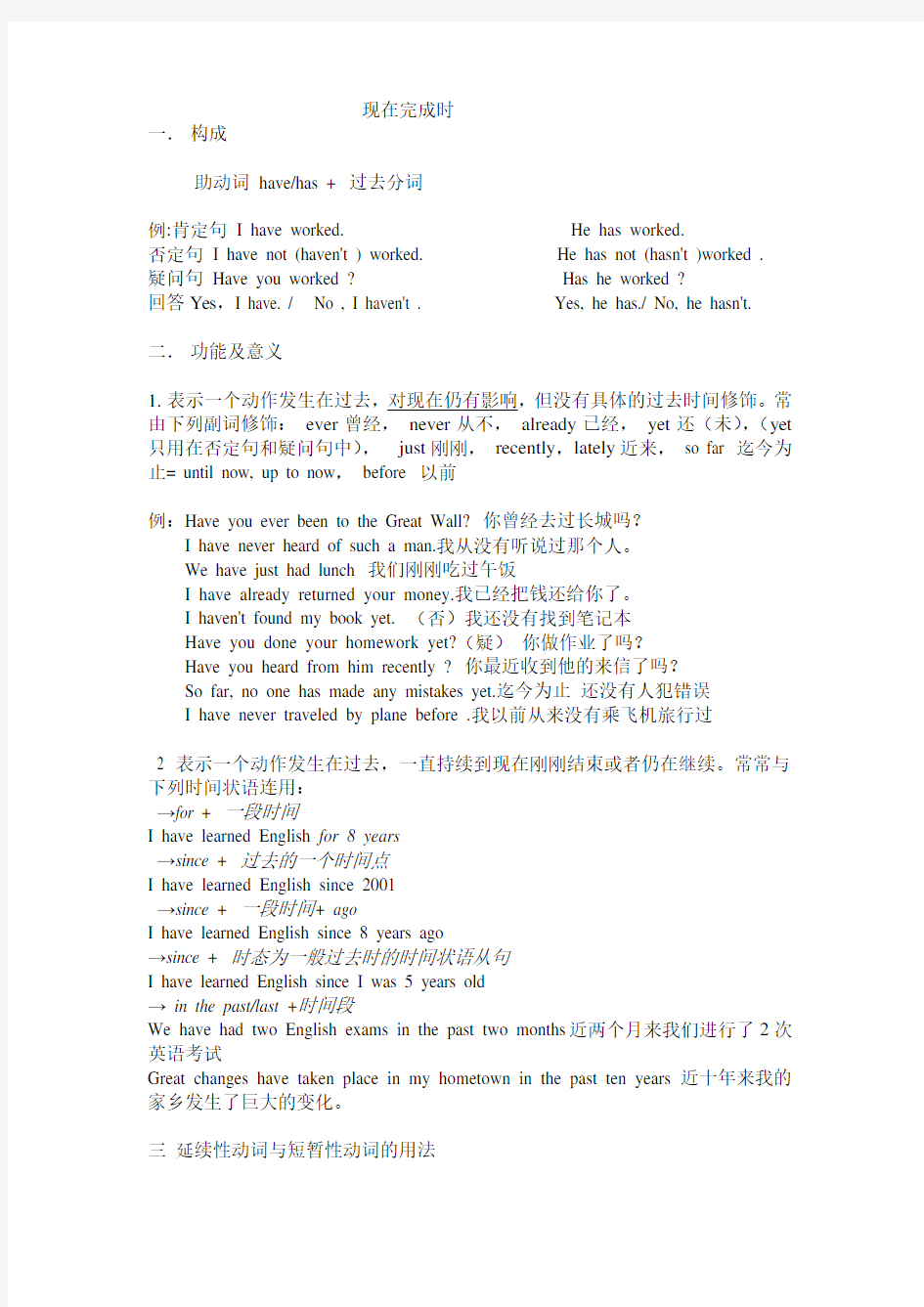

现在完成时
一.构成
助动词have/has + 过去分词
例:肯定句I have worked. He has worked.
否定句I have not (haven't ) worked. He has not (hasn't )worked .
疑问句Have you worked ? Has he worked ?
回答Yes,I have. / No , I haven't . Yes, he has./ No, he hasn't.
二.功能及意义
1.表示一个动作发生在过去,对现在仍有影响,但没有具体的过去时间修饰。常由下列副词修饰:ever曾经,never从不,already已经,yet还(未),(yet 只用在否定句和疑问句中),just刚刚,recently,lately近来,so far 迄今为止= until now, up to now,before 以前
例:Have you ever been to the Great Wall? 你曾经去过长城吗?
I have never heard of such a man.我从没有听说过那个人。
We have just had lunch 我们刚刚吃过午饭
I have already returned your money.我已经把钱还给你了。
I haven't found my book yet. (否)我还没有找到笔记本
Have you done your homework yet?(疑)你做作业了吗?
Have you heard from him recently ? 你最近收到他的来信了吗?
So far, no one has made any mistakes yet.迄今为止还没有人犯错误
I have never traveled by plane before .我以前从来没有乘飞机旅行过
2 表示一个动作发生在过去,一直持续到现在刚刚结束或者仍在继续。常常与下列时间状语连用:
→for + 一段时间
I have learned English for 8 years
→since + 过去的一个时间点
I have learned English since 2001
→since + 一段时间+ ago
I have learned English since 8 years ago
→since + 时态为一般过去时的时间状语从句
I have learned English since I was 5 years old
→ in the past/last +时间段
We have had two English exams in the past two months近两个月来我们进行了2次英语考试
Great changes have taken place in my hometown in the past ten years 近十年来我的家乡发生了巨大的变化。
三延续性动词与短暂性动词的用法
①现在完成时中,与一段时间连用时应注意句中的谓语动词须是延续性动词,非延续性动词不可和一段时间连用。
我离开这所学校已经八年了。
误:I have left this school for eight years(×)
他借用我的词典已经两天了
误:He has borrowed my dictionary for two days(×)
②非延续动词与一段时间连用时,可做相应转化
因此①中例句正确形式分别为
我离开这所学校已经八年了。
正:I have been away from this school for eight years(√)
他借用我的词典已经两天了
正:He has kept my dictionary for two days(√)
其它非延续性动词与时间段连用时的变形
buy→have borrow→ keep,
fall asleep →be asleep leave →be away
begin →be on die →be dead,
join→ be in或be a member of return→ be back
come/arrive→ be in get up →be up,
marry →be married catch a cold→ have a cold
③在否定句中短暂性动词可与短时间连用
I haven't gone to see him for several months(我已经好几个月没有去看他了)
I haven't bought anything for two months
四区分
① have been to +地点; 表示去过某个地方(已经回来),常与ever, never ,几次,等连用
②have gone to +地点: 表示到地方去了(还没回来)
③have been in+地点:表示到了某个地方(多久了),常与for + 段时间连用
比较:He has been to China twice(曾经去过,现在不在中国)
He has gone to China 他到中国去了.(他可能已在去中国的路上,或已到中国,总之,现在不在这里)
He has been in China for two years(他到中国已经两年了)
五对完成时的提问用how long.....? 不能用when... ?
六现在完成时常用句型
1 It is the first/second time....that....结构中的从句部分,用现在完成时
It is the first time that I have visited the city
这是我第一次参观这座城市
It is the third time that the boy has been late
这是这个男生第三次迟到了
2 This is the... that.. 结构,that 从句要用现在完成时
This is the best film that I 've (ever) seen
这是我看过的最好的电影
This is the first time that I've heard him sing
这是我第一次听他唱歌
3 It is / It has been + 时间段+ since ...
It has been/ It's 5 years since we last met.
自从上一次我们相遇到现在已经是五年了
It's / It has been 3 months since the man died 那人死去3个月了
4 一段时间+ 完成时结构+ since 引导的时间状语从句
Two years has passed since I came here.
七现在完成时和一般过去时的区别
现在完成时表示过去发生的某一动作对现在造成的影响或结果,强调的是现在的情况,所以它不能和表示过去的时间状语连用,如yesterday, last night, three weeks ago, in 1998 等。而一般过去时只表示过去的动作或状态,和现在不发生联系,它可以和表示过去的时间状语连用
I have seen the film 我看过这部电影(我了解这部电影的内容)
I saw the film last week 我上周看了这部电影(只说明shangxingqi